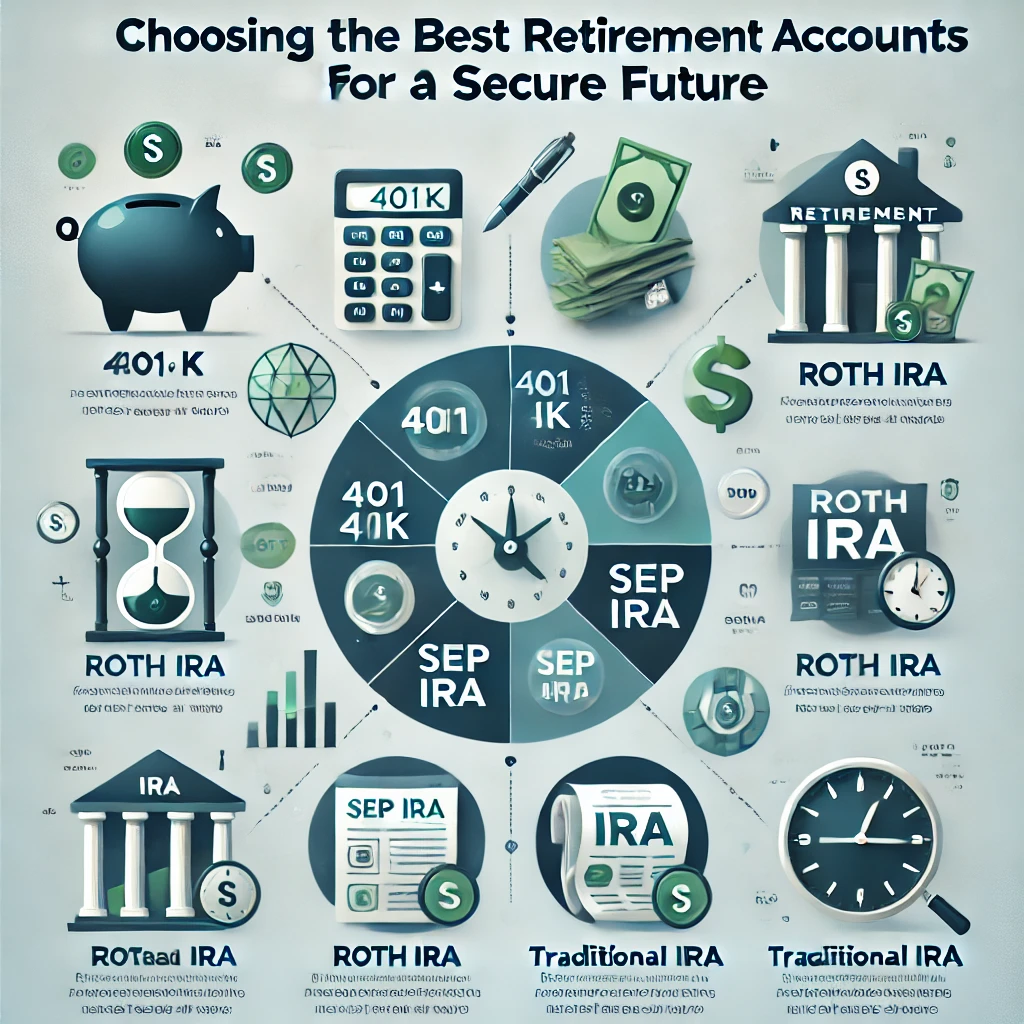Planning for retirement is a journey that requires thoughtful consideration of options, and one of the first steps is choosing the right retirement accounts. With the myriad of choices available, from IRAs to employer-sponsored plans, understanding each account’s benefits, limitations, and tax implications can make all the difference. Knowing how to align these options with your retirement goals, income level, and investment strategy will give you a strong start on your path to financial security.
Below, we’ll dive into the essential aspects of selecting the best retirement accounts, highlighting the differences between accounts, tax benefits, and the factors you should consider in planning for a future where you can retire comfortably and securely.
Understanding Retirement Accounts and Their Importance
Retirement accounts offer unique advantages that help individuals grow their savings through tax-deferred or tax-free gains. Choosing the best retirement account is crucial for maximizing savings while minimizing tax liabilities. The right retirement account can help you plan for the financial independence and lifestyle you envision after leaving the workforce. Since each account has different benefits, understanding these options is key to building a portfolio that aligns with your goals.
Types of Retirement Accounts
When it comes to retirement savings, there are two primary types of retirement accounts: employer-sponsored accounts and individual retirement accounts (IRAs). Both offer tax advantages, but they serve different purposes and have varying rules for contributions, withdrawals, and investment flexibility.
Employer-Sponsored Accounts
Employer-sponsored retirement accounts are designed to encourage employees to save for retirement by offering tax benefits and, often, company contributions. Some common types include 401(k) plans, Roth 401(k)s, and SIMPLE IRAs for smaller businesses.
401(k) Plans: Pros and Cons
A 401(k) is one of the most popular employer-sponsored retirement plans, allowing employees to contribute a portion of their salary, often matched by the employer. Contributions to a traditional 401(k) are made pre-tax, which lowers your taxable income. However, withdrawals during retirement are taxed as ordinary income. For those looking to maximize savings with employer contributions, a 401(k) is an excellent choice.
Pros:
- Pre-tax contributions reduce taxable income.
- Employer matching boosts savings.
- High contribution limits compared to IRAs.
Cons:
- Withdrawals are taxed as income in retirement.
- Limited investment options within the plan.
Roth 401(k) Plans
A Roth 401(k) functions similarly to a traditional 401(k) but with a key difference: contributions are made with after-tax income. This means that while there is no immediate tax deduction, withdrawals during retirement are entirely tax-free. This option is ideal for individuals who expect to be in a higher tax bracket in retirement.
SEP IRAs for Small Business Owners
A Simplified Employee Pension (SEP) IRA is a popular choice for self-employed individuals and small business owners. Contributions to a SEP IRA are tax-deductible and have higher limits than traditional IRAs, making it an appealing option for business owners looking to maximize retirement contributions.
SIMPLE IRA: An Alternative for Small Businesses
The SIMPLE IRA (Savings Incentive Match Plan for Employees) offers a streamlined option for small businesses. It allows both employers and employees to contribute, similar to a 401(k), but has lower contribution limits. SIMPLE IRAs are known for their ease of setup and lower administrative costs, making them a great choice for small businesses without extensive resources for managing retirement plans.
Individual Retirement Accounts (IRAs)
IRAs are retirement accounts that you set up independently, providing flexibility for those who don’t have access to an employer-sponsored plan. Two popular types are the Traditional IRA and the Roth IRA, each with unique tax advantages and implications.
Traditional IRA: Tax-Deferred Savings
With a Traditional IRA, contributions may be tax-deductible, depending on your income level and access to other retirement plans. Earnings grow tax-deferred until retirement, meaning you only pay taxes when you start taking withdrawals. Traditional IRAs are suitable for those looking to lower their current tax liability and benefit from tax-deferred growth.
Roth IRA: Tax-Free Growth Opportunity
Roth IRAs stand out for their tax-free withdrawals in retirement, provided certain conditions are met. While contributions are made with after-tax income, your earnings grow tax-free, and withdrawals during retirement are not subject to taxes. This account is an ideal option for individuals who anticipate being in a higher tax bracket during retirement.
Self-Directed IRAs: Greater Investment Freedom
A Self-Directed IRA (SDIRA) offers broader investment options beyond stocks and bonds, including real estate, commodities, and private equity. With this account, investors have greater control and can diversify their portfolios significantly. However, self-directed IRAs come with higher risk and require careful management to stay compliant with IRS rules.
Solo 401(k) for Self-Employed Individuals
A Solo 401(k), also known as an Individual 401(k), is designed for self-employed individuals or business owners with no employees (except possibly a spouse). The Solo 401(k) offers high contribution limits and the potential for both employee and employer contributions, making it one of the most flexible and generous retirement accounts for sole proprietors.
You Can Also read : How to Avoid Common Debt Traps: Smart Tips for Better Financial Health
Retirement Accounts for High-Income Earners
High-income earners often face limitations with retirement accounts due to income thresholds on contributions. However, strategies like the Backdoor Roth IRA and defined benefit plans provide alternative ways to maximize retirement contributions.
